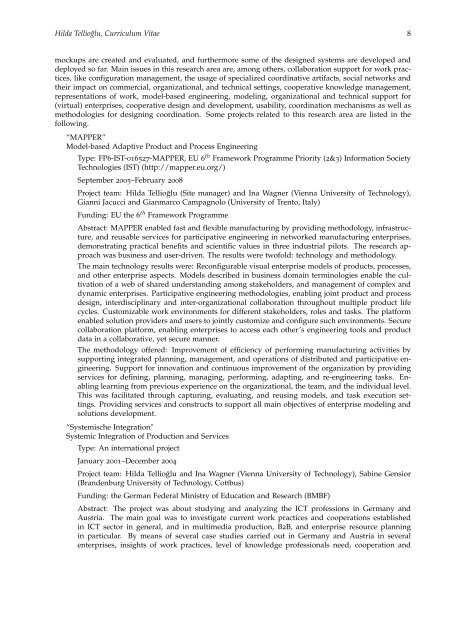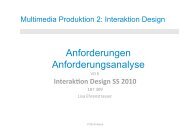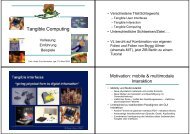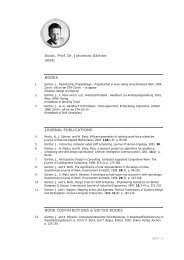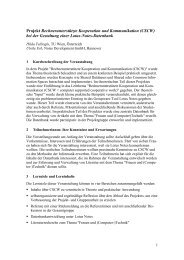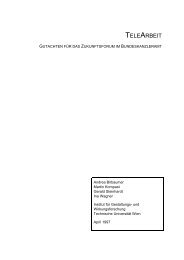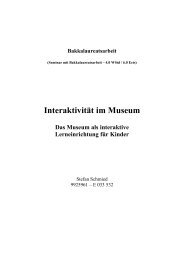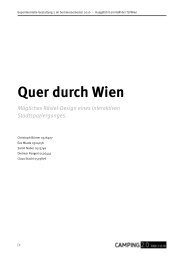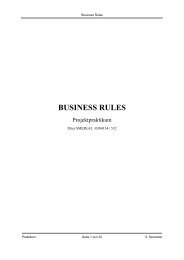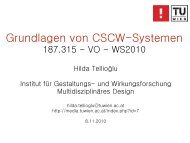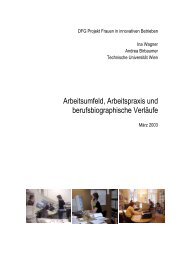Hilda Tellioglu, Curriculum Vitae - Technische Universität Wien
Hilda Tellioglu, Curriculum Vitae - Technische Universität Wien
Hilda Tellioglu, Curriculum Vitae - Technische Universität Wien
You also want an ePaper? Increase the reach of your titles
YUMPU automatically turns print PDFs into web optimized ePapers that Google loves.
<strong>Hilda</strong> Tellio˘glu, <strong>Curriculum</strong> <strong>Vitae</strong> 8<br />
mockups are created and evaluated, and furthermore some of the designed systems are developed and<br />
deployed so far. Main issues in this research area are, among others, collaboration support for work practices,<br />
like configuration management, the usage of specialized coordinative artifacts, social networks and<br />
their impact on commercial, organizational, and technical settings, cooperative knowledge management,<br />
representations of work, model-based engineering, modeling, organizational and technical support for<br />
(virtual) enterprises, cooperative design and development, usability, coordination mechanisms as well as<br />
methodologies for designing coordination. Some projects related to this research area are listed in the<br />
following.<br />
“MAPPER”<br />
Model-based Adaptive Product and Process Engineering<br />
Type: FP6-IST-016527-MAPPER, EU 6 th Framework Programme Priority (2&3) Information Society<br />
Technologies (IST) (http://mapper.eu.org/)<br />
September 2005–February 2008<br />
Project team: <strong>Hilda</strong> Tellio˘glu (Site manager) and Ina Wagner (Vienna University of Technology),<br />
Gianni Jacucci and Gianmarco Campagnolo (University of Trento, Italy)<br />
Funding: EU the 6 th Framework Programme<br />
Abstract: MAPPER enabled fast and flexible manufacturing by providing methodology, infrastructure,<br />
and reusable services for participative engineering in networked manufacturing enterprises,<br />
demonstrating practical benefits and scientific values in three industrial pilots. The research approach<br />
was business and user-driven. The results were twofold: technology and methodology.<br />
The main technology results were: Reconfigurable visual enterprise models of products, processes,<br />
and other enterprise aspects. Models described in business domain terminologies enable the cultivation<br />
of a web of shared understanding among stakeholders, and management of complex and<br />
dynamic enterprises. Participative engineering methodologies, enabling joint product and process<br />
design, interdisciplinary and inter-organizational collaboration throughout multiple product life<br />
cycles. Customizable work environments for different stakeholders, roles and tasks. The platform<br />
enabled solution providers and users to jointly customize and configure such environments. Secure<br />
collaboration platform, enabling enterprises to access each other’s engineering tools and product<br />
data in a collaborative, yet secure manner.<br />
The methodology offered: Improvement of efficiency of performing manufacturing activities by<br />
supporting integrated planning, management, and operations of distributed and participative engineering.<br />
Support for innovation and continuous improvement of the organization by providing<br />
services for defining, planning, managing, performing, adapting, and re-engineering tasks. Enabling<br />
learning from previous experience on the organizational, the team, and the individual level.<br />
This was facilitated through capturing, evaluating, and reusing models, and task execution settings.<br />
Providing services and constructs to support all main objectives of enterprise modeling and<br />
solutions development.<br />
“Systemische Integration"<br />
Systemic Integration of Production and Services<br />
Type: An international project<br />
January 2001–December 2004<br />
Project team: <strong>Hilda</strong> Tellio˘glu and Ina Wagner (Vienna University of Technology), Sabine Gensior<br />
(Brandenburg University of Technology, Cottbus)<br />
Funding: the German Federal Ministry of Education and Research (BMBF)<br />
Abstract: The project was about studying and analyzing the ICT professions in Germany and<br />
Austria. The main goal was to investigate current work practices and cooperations established<br />
in ICT sector in general, and in multimedia production, B2B, and enterprise resource planning<br />
in particular. By means of several case studies carried out in Germany and Austria in several<br />
enterprises, insights of work practices, level of knowledge professionals need, cooperation and


